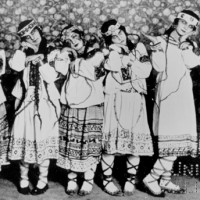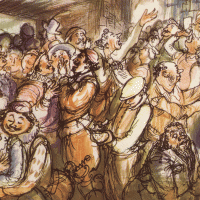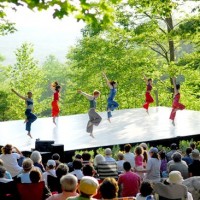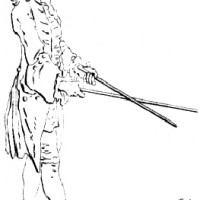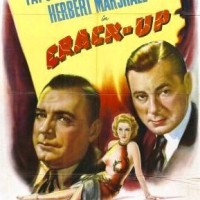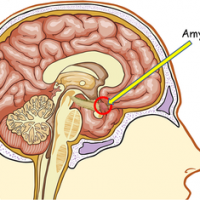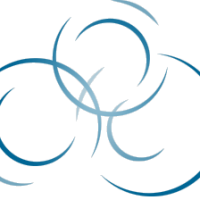We are accustomed to describing the premiere of Le Sacre du Printemps as a riot. That’s what the history books say and that’s what Wikipedia says so there you have it. But another way of framing Sacre is to call it one of the last examples of more than 2500 years of audience-centered social interpretation in the Western arts tradition. That infamous uproar was not so much an aberration as it … [Read more...]
Pay Attention to the Show! (Or What You Will)
I’m sitting on a blanket on the lawn of the Boston Common, sipping my Pinot Grigio out of a water bottle (like half the audience) and finishing my sandwich (pesto, sun-dried tomatoes and goat cheese=good). On my right a family group with several young children are huddled around a smart phone looking at a video and laughing (the mother too). Just a few minutes ago they were all laughing at Sir … [Read more...]
In Praise of Spoilers (and a plug for Jacob’s Pillow)
I have been invited to participate in a Pillow Talk discussion at Jacob’s Pillow Dance Festival on July 11 (5 p.m. for those heading to The Berkshires this weekend). “Talking About Dance” will be moderated by Scholar-in-Residence Maura Keefe and also includes Christine Jowers from Dance Enthusiast and Nancy Wozny from CultureMap Houston and Dance Magazine. I’m a big fan of the audience … [Read more...]
Or How I Learned to Stop Worrying and Love the Big Data
In a post from a few weeks ago I stated that the term “research” is often narrowly defined in the arts industry, at least that part of the industry controlled by funders and agencies. I argued for a broader definition of what constitutes data (big or otherwise). My data, for example, come from the historical archive and from a variety of contemporary narrative sources that provide information … [Read more...]
Crossing the Research Divide
A few weeks ago I was invited to present on my concept of Arts Talk at the University of Chicago’s Cultural Policy Center. (Here’s the link to the video of my talk if you’re interested.) Among the many valuable aspects of my Chicago visit was a stimulating dinner conversation with Executive Director Betty Farrell and Research Manager Jennifer Novak-Leonard about the definition of arts research. … [Read more...]
Divining “Artistic Excellence”
In the arts industry, “artistic excellence” is routinely posited as an empirical fact—a thing outside of our individual heads and hearts that is locatable, measurable, quantifiable and justifiable. Like thirsty shamens with divining rods, somehow those of us with aesthetic expertise can locate artistic excellence through the vibrations we feel when we get near it. I’m skeptical. First of all, I … [Read more...]
Crack-Up: Taste, Anxiety and American Populism
In a post from early February I brought up our collective anxiety over the rules of taste and promised to explore the issue in greater detail, but then got sidetracked with other topics. Yesterday morning (while looking for ways to avoid a big pile of end-of-semester grading), I wandered across a 1946 film noir called Crack-up showing on TCM. The story focuses on an art critic and “anti-snobbery … [Read more...]
Silence or Violence
At the college where I teach I’ve recently had some interesting experiences with the concept of nonviolent communication. The term was coined by psychologist Marshall Rosenberg some forty years ago, the result of his experience as a civil rights activist and his continuing interest in peace work. According to the Center for Nonviolent Communication website, Nonviolent Communication (NVC) is based … [Read more...]
The Talking Cure, Part V (effective facilitation)
In my observation, the best audience-centered interpretive experiences are rooted in effective facilitation. But here’s the key—the facilitator is an instrument dedicated to creating a hospitable learning environment, not an ego looking to be fulfilled. The facilitator does not make the meaning and give it to an audience . The facilitator establishes the environment and the tools for artists and … [Read more...]
The Talking Cure, Part IV (powerful questioning and attentive listening)
In the first part of Chapter 5 of my new book, I look at two key aspects of productive talk: powerful questioning and effective listening. In the second part of the chapter I survey various techniques for questioning and listening, argumentation, and debate as well as the role that personal responses—ideas, feelings, emotions, life stories—can play in the meaning making process. I end the chapter … [Read more...]

